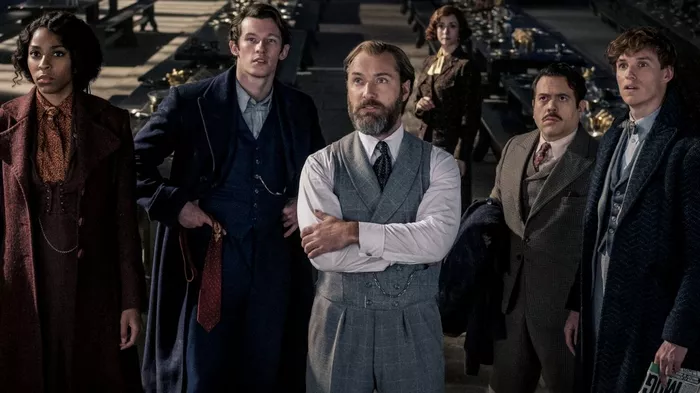The Wizarding World has captivated audiences worldwide with its magical tales of friendship, bravery, and the eternal struggle between good and evil. However, as the universe expands with prequels like the Fantastic Beasts series, some fans argue that the cinematic adaptations of J.K. Rowling’s beloved stories have taken a misstep, particularly when it comes to the character of Gellert Grindelwald. While the Fantastic Beasts prequel movies held the promise of exploring Grindelwald’s complex relationship with Albus Dumbledore, it appears they may be unable to rectify the alterations made to his death, a pivotal moment that lost its depth in the transition from page to screen.
I. A Meaningful and Nuanced Death in the Books:
In the Harry Potter books, Gellert Grindelwald’s demise is a poignant and multifaceted moment. Rowling masterfully crafted a narrative where the dark wizard, once Dumbledore’s friend and confidant, expresses genuine remorse for his actions. Grindelwald’s death is not merely a spectacle of magical combat; it is a moment of redemption and reflection. The books give readers a glimpse into the complexities of morality and the consequences of choices, offering a depth that the movies failed to capture.
II. Lost Nuance in Cinematic Translation:
The transition from page to screen often poses challenges for filmmakers, and Grindelwald’s death is a notable casualty of this adaptation process. In the Harry Potter film series, the climactic battle between Grindelwald and Voldemort’s forces is visually striking but lacks the emotional weight and nuance present in the books. The cinematic portrayal reduced Grindelwald to a mere antagonist meeting his end, stripping away the layers of remorse and introspection that defined his character in Rowling’s narrative. Fans were left longing for the profound and emotionally charged moment that the books had provided.
III. Opportunity Missed in Fantastic Beasts:
The introduction of the Fantastic Beasts prequel series presented an opportunity to revisit Grindelwald’s character and delve into the intricacies of his relationship with Dumbledore. However, the movies continued the trend of simplifying his character, missing a chance to explore the shades of gray that make the Wizarding World so compelling. While Johnny Depp’s portrayal of Grindelwald brought charisma to the role, the scripts failed to fully utilize the character’s potential for moral ambiguity and internal conflict.
IV. Uncertain Future for Fantastic Beasts:
As the Fantastic Beasts franchise navigates its future, the lingering question of whether it can address and rectify the shortcomings of Grindelwald’s portrayal remains. The departure of Johnny Depp from the role added another layer of uncertainty, leaving fans wondering how the change in casting would affect the character’s development. With the announcement of a Harry Potter TV remake, the focus on the original series may divert attention from Grindelwald’s narrative, prolonging the wait for a more faithful adaptation of his meaningful and nuanced death.
V. The Challenge of Adapting Complex Characters:
Adapting a beloved literary work to the screen is a delicate balancing act, and the challenge intensifies when dealing with complex characters like Grindelwald. The richness of Rowling’s writing allows for intricate character development, but translating that complexity to film requires careful consideration and a commitment to preserving the essence of the source material. In the case of Grindelwald, the movies struggled to capture the depth and nuance that made his character memorable in the books.
VI. The Impact of Visual Storytelling:
Visual storytelling is a powerful tool, but it comes with its own set of limitations. The Harry Potter movies, while visually stunning and successful in many aspects, sometimes sacrificed the internal struggles and emotional depth of characters for spectacle. Grindelwald’s transformation from a character with genuine remorse to a more stereotypical dark wizard in the films reflects the challenge of balancing the visual demands of cinema with the nuanced storytelling found in the books.
VII. Long Wait for Redemption:
As the Wizarding World expands with new projects and adaptations, fans may find themselves waiting for a redemption of Grindelwald’s character on screen. The uncertain future of the Fantastic Beasts franchise, coupled with the announcement of a Harry Potter TV remake, suggests that the timeline for a faithful adaptation of Grindelwald’s meaningful and nuanced death may be extended. The challenge lies in whether future adaptations can learn from the missteps of the past and do justice to a character whose complexity is integral to the magic of J.K. Rowling’s world.
In conclusion, the cinematic portrayal of Gellert Grindelwald’s death in the Harry Potter movies diverged significantly from the nuanced and meaningful moment depicted in J.K. Rowling’s books. The transition from page to screen failed to capture the emotional depth and complexity of the character, setting a precedent that the Fantastic Beasts prequel series struggled to overcome. As the Wizarding World continues to evolve on screen, the challenge remains to do justice to characters like Grindelwald, ensuring that their complexity is preserved and celebrated in the visual medium. Only time will tell whether future adaptations can rectify the missteps of the past and provide the redemption that fans of the Wizarding World yearn for.

